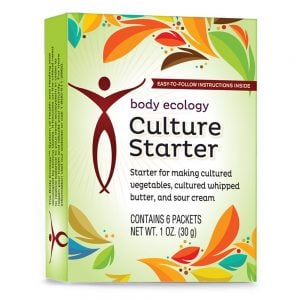Why American Guts Are in Trouble
One very common bacterium found in the gut, E. coli, has acquired one eighth of its genome through horizontal gene transfer. In other words, one eight of its genome comes from swapping genes with a neighboring bacteria.
Relatively speaking, E. coli’s genetic makeup is remarkable. Not only that, but E. coli is one of the more social microbes, frequently giving away genes to other bacteria.
The phenomenon of horizontal gene transfer means that bacteria are highly adaptable—and accounts for one reason why they so easily acquire resistance to antibiotics. This cross-talk and swap also implies that diet plays a pivotal role in deciding exactly what kind of microbiome your gut harbors.
What You Haven’t Been Told About Your Gut Health and Processed Foods

Did you know gut bacteria can adapt to your diet? Fermented foods, like cultured veggies made from the Veggie Culture Starter, can rebuild a gut that has been damaged by processed foods.
As you know so well, the standard American diet consists of processed, devitalized foods that have been completely stripped of all bacteria. A large percentage of the standard American diet (SAD) consists of fiber-less, monochrome foods such as bread, pasta, baked goods, refined grains, and potatoes made largely of gummy starches and sugars.
The adaptability of your gut bacteria matters when it comes to diet. Right now, 35 percent of Americans are obese. This can be blamed on a number of factors, including sedentary lifestyle and diet.
The obesity epidemic has also been linked to gut bacteria.
Researchers conducted a fascinating study on obesity, recently published in Science. Starting with genetically identical baby mice raised in a germ-free and bacteria-free environment, scientists populated the infant mice’s guts with gut bacteria from obese women and their lean twin sisters. The mice ate the same food in the same portions, yet those with obese bacteria gained weight and had higher body fat. Obese mice also had noticeably less diverse gut bacteria.1
In the first study of its kind to report on hunter-gatherer gut bacteria, the effects of the standard American diet were obvious: Gut bacteria respond to the modern diet, and those living in rural areas who consume a diet low in processed foods have more diverse gut bacteria. When researchers analyzed bacteria in the feces of the Hadza people of Tanzania, one of the last hunter-gatherer communities in the world, the Hadza had a more diverse inner ecosystem than Italians eating a modern diet.2
This gut bacteria diversity is critically important. Even though the Hadza had high levels of a pathogenic bacterium known to cause disease in Western populations, the people had few cases of diabetes, obesity, and autoimmune disorders, all associated with gut bacteria imbalances.
Processed foods do not create a healthy gut and do not feed the right kind of bacteria you want growing inside you. Thus, American guts are in trouble.
The Only Hope for the American Gut
The Body Ecology Diet discourages this type of diet for many reasons—one being that such a diet feeds pathogenic microbes in the gut. Incorporating fermented foods and probiotic beverages is essential to preserve a healthy gut microbiome.
Our bodies are very much like landscapes, and the direction our health takes is not solely dependent on our own genome.
Because our own cells are outnumbered 10 to one by bacteria, it is important to remember the constant dialogue that takes place. This dialogue occurs between cells and, we are now finding, even between the DNA of every cell—whether human or not, beneficial or pathogenic. A daily practice of Body Ecology living that includes fermented foods and probiotic beverages is the best way to help your gut evolve to support your health.
What To Remember Most About This Article:
Your gut is adaptable. Because of horizontal gene transfer, your gut bacteria respond directly to their environment and to the food that you eat. This is one major reason why gut bacteria can become antibiotic resistant. This also explains why your diet can be so detrimental to your health.
Sadly, the standard American diet is a nutrient-poor, processed food diet stripped of all bacteria. The obesity epidemic has been linked to such unhealthy foods and bacteria in the gut. Recent research has associated less bacterial diversity in the gut with obesity; scientists also discovered that Tanzanian hunter-gatherers have a more diverse inner ecosystem because their guts have not adapted to a processed diet.
The Body Ecology Diet is an antidote to the modern diet that feeds obesity and disease. Enjoying fermented foods and probiotic beverages daily will help your gut bacteria adapt. You’ll be rewarded with a diverse inner ecosystem that paves the way to longevity and health.
- [product id=”22″]
- [product id=”200″]
- [product id=”1″]
REFERENCES:
- “How Gut Bacteria Help Make Us Fat and Thin.” Scientific American Global RSS.
- “Not Everyone Needs Probiotics, Suggests Study of Hunter-Gatherer Guts.” Not Everyone Needs Probiotics, Suggests Study of Hunter-Gatherer Guts.








